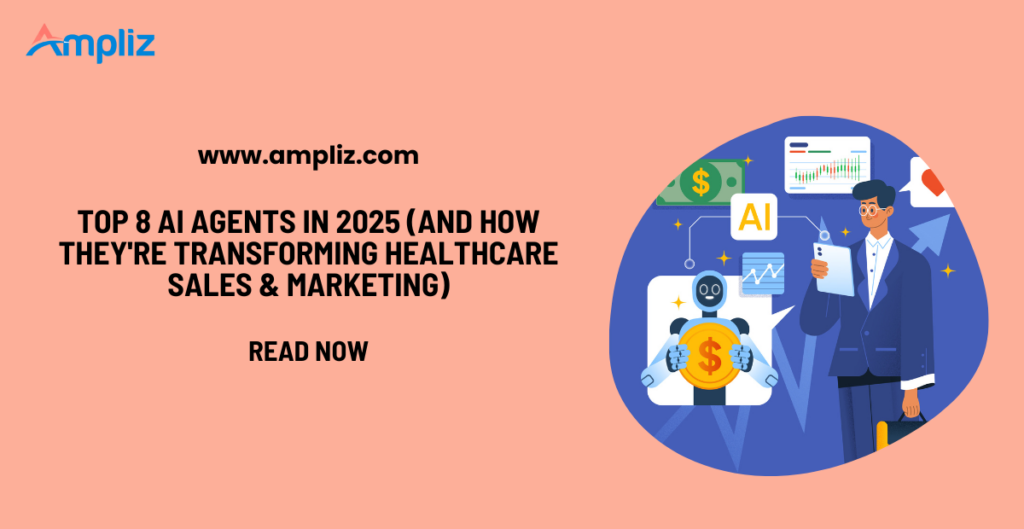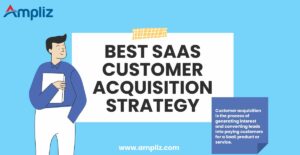AI agents have evolved far beyond simple chatbots. What started as co-pilots offering suggestions in the background has now become something far more powerful.
In 2026, we’re officially in the “do-it-for-you” era.
Today’s AI agents are managing entire workflows, including coding, writing outreach emails, booking meetings, conducting lead research, designing campaigns, and even making hiring decisions. And this shift is especially impactful for sales, marketing, and recruiting teams in fast-paced industries like healthcare, where agility and data-driven execution are critical.
But with dozens of new AI agents hitting the market, how do you know which ones actually deliver on their promise?
We’ve narrowed it down to 8 of the most forward-thinking AI agents in 2026. These platforms are not just tools but autonomous collaborators. Some are built for developers, others for content teams, and a few are engineered to streamline the exact workflows you’re juggling every day.
Before we dive in, let’s take a step back. What is an AI agent, exactly?
What Is an AI Agent and How Is It Different from a Chatbot?
If you’ve used tools like ChatGPT, Gemini, or Claude, you’re familiar with prompt-response AI. You ask a question, it gives an answer. That’s helpful, but limited.
AI agents go several steps further. Instead of just replying, they act. Agents are designed to perform multi-step tasks, make decisions on your behalf, and adapt in real-time. Instead of digital assistants, they act more like independent digital employees.
Here’s how AI agents differ from traditional AI tools:
- Goal-Oriented Execution: Instead of relying on prompts for every step, agents work toward outcomes like “build a targeted prospect list” or “schedule and follow up on interviews.”
- Multi-Step Logic: Agents break down objectives into subtasks, sequence them, and execute in a logical order, while looping in tools, APIs, and external data as needed.
- Autonomous Decision-Making: Agents proactively detect roadblocks, find workarounds, and ask for clarification only when necessary. They don’t stop at “I don’t know.”
AI agents are changing the way work gets done, especially in industries like healthcare, where data privacy, speed, and operational precision matter.
One of the platforms on this list — Moxby — is pushing the envelope on what AI agents can achieve in end-to-end business automation.
Let’s get into the list.
Best AI Agents in 2026
The healthcare industry is experiencing a surge in innovative, self-built solutions, with new players entering the scene regularly. Let’s explore some cutting-edge AI agents that are transforming various aspects of work, from operations management to customer interactions.
1. Moxby: The Self-Evolving AI Agent Built to Replace SaaS
Moxby is a next-generation AI super agent that does the actual work, not just suggests it. From building outreach workflows to generating content, analyzing performance, and even coding internal tools, Moxby replaces a fragmented stack of SaaS tools with a single, intelligent AI workspace.
Need a targeted email campaign? Moxby will:
- Write the email copy
- Segment your list based on behavior or CRM data
- Schedule and send the campaign
- Analyze opens, clicks, and conversions
- Adjust messaging based on what works, in real time
For healthcare recruiters or enterprise sales teams juggling multiple tools and workflows, this kind of end-to-end automation is game-changing.
What Sets Moxby Apart:
- Custom Software On Demand: Describe the tool or workflow you need and Moxby will design, build, and deploy it automatically.
- Fully Autonomous Campaigns: Moxby doesn’t wait for your next prompt. It runs lead generation, follow-ups, performance tracking, and adjustments on its own.
- Self-Evolving Capabilities: Moxby’s agents learn and self-code new functions based on what your business needs, continuously improving over time.
Instead of stitching together CRMs, analytics tools, content platforms, and outreach apps, Moxby gives you one workspace that does it all. For teams that want speed, control, and vendor independence, this isn’t just a productivity boost but a paradigm shift.
If Moxby shows us what’s possible when AI takes full control of business workflows, our next entry demonstrates how agents can combine multiple senses and modalities to interact with the world more like a human.
2. Manus: The Multimodal Agent That Sees, Listens, and Acts
Developed by the Chinese startup Monica, Manus is a general-purpose AI agent built to autonomously perform complex, multi-step tasks without needing constant human supervision.
Whether it’s analyzing financial trends, screening job applicants, or evaluating real estate opportunities, Manus handles the entire process end-to-end. It operates asynchronously in the cloud, meaning it can manage tasks continuously in the background, making it especially valuable for data-heavy industries like healthcare, recruiting, and operations.
For example, when tasked with candidate screening, Manus can:
- Unzip a folder of résumés
- Extract and evaluate key qualifications
- Rank applicants based on custom criteria
- Generate reports in formats like CSV or Excel
What sets Manus apart is its multimodal capability. It can process text, code, files, and visual data in tandem, closing the gap between strategic input and real-world execution.
While still in early development, Manus offers a compelling glimpse at the future of AI agents as autonomous collaborators, not just reactive assistants.
While Moxby and Manus are redefining workflows across teams, some AI agents are focused on transforming how developers build apps, from writing code to deployment. That brings us to Cursor.
3. Cursor: The Dev Agent That Works Inside Your Codebase
Cursor is a next-gen development environment powered by AI, built as a fork of Visual Studio Code.
Cursor blends the familiarity of a traditional IDE with intelligent agent capabilities that help you write, refactor, and understand code using plain language. Whether you’re maintaining legacy systems, building new tools, or integrating with healthcare APIs, Cursor reduces manual effort and accelerates the entire development cycle.
What Cursor Can Do:
- Natural Language Editing: Refactor functions, rewrite components, or generate entirely new blocks of code with simple prompts.
- AI-Powered Autocomplete: Suggests full-line and multi-line completions based on your existing code.
- Smart Rewrites: Automatically optimize loops, clean up conditionals, and simplify logic.
- Contextual Codebase Search: Ask questions about your codebase in natural language and get relevant results instantly.
- Privacy & Compliance: With Privacy Mode and SOC 2 certification, Cursor keeps your code secure, which is crucial for regulated industries like healthcare.
It even goes beyond the code editor, automating tasks like generating commit messages and turning Figma designs into functional components.
For engineering teams in fast-moving sectors like healthtech, Cursor enables faster iteration, fewer errors, and cleaner handoffs without the overhead of switching between tools.
Beyond transforming the way we work, AI agents are democratizing who gets to build. And if your team needs custom tools fast but lacks in-house dev power, this next entry is a game-changer.
4. Lovable – Full-Stack Apps from a Single Prompt
Ever had an app idea but no time, team, or technical skills to build it? Lovable takes care of all that. It’s an AI platform that turns natural language into fully functional, full-stack web apps. No code, no setup, and no friction.
Just describe what you want (e.g., “a lead capture app with CRM integration”), and Lovable scaffolds your project, writes the code, debugs it, and deploys it live, all inside your browser.
Why Lovable Stands Out:
- Natural Language App Generation: Skip the specs and tech stack decisions. Just type your idea and let the agent build it out.
- AI-Powered Coding: Real-time suggestions, autocomplete, and automatic debugging for faster iteration.
- No Setup Needed: Lovable handles your dev environment, so you can focus on functionality instead of configs.
- One-Click Deployment: Deploy apps instantly to Supabase or your own domain.
- Built-in Collaboration: Share projects or edit live with teammates (collaboration features currently in beta).
For sales, marketing, or recruiting teams in healthcare that need tools tailored to niche workflows, Lovable bridges the gap between idea and execution without waiting on a dev sprint.
Not every AI agent replaces your developers; some supercharge them. If you’re looking to turn ideas into working apps without bottlenecks or setup headaches, Replit is your go-to cloud workspace.
5. Replit: From Idea to App in Minutes
Replit turns your browser into a powerful, all-in-one development environment. No installs, no configs, just code.
Whether you’re a junior dev, a product marketer experimenting with internal tools, or part of a healthtech startup, Replit helps you go from concept to deployed app in record time.
At the core of Replit is its AI Agent, a built-in assistant that takes your plain-language instructions and translates them into functional, production-ready code. It can scaffold your project, hook in databases, write logic, and deploy, all from a single prompt.
What Makes Replit Shine:
- Natural Language to Code: Describe what you want to build, and the AI Agent takes care of the setup and logic.
- Live Collaboration: Team members can co-code in real time, perfect for remote dev teams or technical marketing squads.
- One-Click Deployment: Launch your app straight from the editor.
- Multi-Language Support: Code in over 50 languages, from Python to JavaScript to SQL.
- AI-Powered Debugging and Scaffolding: Let the AI handle boilerplate and troubleshoot bugs while you focus on features.
Replit is especially useful for rapid prototyping, internal tools, or teaching coding within cross-functional teams. For healthcare businesses looking to spin up new digital experiences fast without waiting on a full dev cycle, Replit is like having a startup lab in your browser.
The rise of AI agents isn’t just about speed. It’s about autonomy. And no tool embodies that better than Devin.
6. Devin: The First AI Software Engineer (That Ships)
Built by Cognition, Devin is the first AI agent to earn the title “software engineer.” And it’s not just a flashy label: Devin can actually plan, code, debug, and deploy real software on its own.
Unlike tools that merely assist humans, Devin works independently. Feed it a GitHub issue, and Devin will spin up a dev environment, reproduce the bug, write a fix, run tests, and submit a pull request, all without nudging a human for help.
What Devin Can Do:
- End-to-End Development: From feature specs to deployment pipelines, Devin runs the full dev lifecycle.
- Autonomous Debugging: Spots issues, tests fixes, and validates solutions without human supervision.
- Tech Stack Agnostic: Learns new tools and frameworks by reading docs like a real developer.
- Trains AI Models: Beyond coding apps, Devin can also handle ML workflows, training models from scratch.
Devin is still evolving, but the vision is clear: a world where companies can assign full sprints to an AI and get shippable, production-grade code in return. For lean healthcare tech teams or startups needing to accelerate without scaling headcount, Devin is a game-changer.
Not every AI agent aims to run your whole stack. Some focus on doing one thing brilliantly, like building UIs. That’s where v0 comes in.
7. v0: The UI Agent That Builds Interfaces from Text
Built by Vercel, v0 is a frontend-focused AI agent that turns natural language into clean, production-ready UI components.
Describe what you want, like “a pricing table with three tiers” or “a dark-themed login modal,” and v0 instantly outputs React components styled with Tailwind CSS.
It’s not trying to build your whole app. Instead, v0 specializes in interface generation, making it ideal for frontend devs who want to prototype fast or skip repetitive layout work.
What Makes v0 Stand Out:
- Text-to-UI Generation: Write a simple prompt, get functional JSX components instantly.
- Tailwind-Ready: All components are styled with Tailwind CSS for responsiveness and theme consistency.
- Multiframework Support: While built for React and Next.js, it also supports Svelte, Vue, Remix, and more.
- Image-to-UI Mode: Upload a screenshot or mockup, and v0 will generate matching components for it.
v0 integrates directly with Vercel’s dashboard, making it easy to test, tweak, and deploy your designs without context switching. Whether you’re building a fresh UI or upgrading an existing interface, v0 helps you move from idea to pixel-perfect code in seconds.
If clean design and fast iteration are your priorities, v0 is the perfect AI teammate.
Rounding out our list is one of the pioneers that put autonomous AI agents on the map.
8. AutoGPT: The OG Autonomous Agent That Plans and Executes
AutoGPT was among the first AI agents to truly chain thoughts, take initiative, and pursue goals independently. Though its interface can feel a bit rough and the setup requires some effort, AutoGPT remains a powerful open-source platform for building custom autonomous workflows.
Powered by OpenAI’s GPT-4, AutoGPT breaks down high-level objectives into detailed subtasks and executes them step-by-step, without needing constant human input. Whether it’s conducting market research, compiling reports, or managing content creation, AutoGPT handles the whole process from planning to delivery.
What AutoGPT Brings to the Table:
- Full Autonomy: Plans, manages, and completes tasks independently from start to finish.
- Multi-Agent Coordination: Orchestrates multiple AI agents to tackle complex workflows efficiently.
- Natural Language Goals: Understands and acts on user-defined objectives in plain English.
- Wide Application: Useful across industries for content, data analysis, virtual assistance, and more.
However, AutoGPT’s open-ended autonomy can lead to issues like inaccurate results from self-feedback loops, higher costs due to recursive processing, and occasional task looping without oversight.
Still, it’s a landmark project showing how far autonomous AI agents have come.
How to Choose the Right AI Agent for Your Needs
The perfect AI agent for you is not necessarily the newest or flashiest tool on the market. It’s the tool that truly fits your workflow, technical comfort level, and long-term business goals.
Here’s a practical guide to help you make that choice:
1. Define Your Primary Objective
Start by pinpointing the problem you want to solve.
Are you aiming to launch a product quickly? Automate outreach and lead management? Or build fully custom apps without touching a line of code?
Different AI agents specialize in different tasks, so your use case should guide your decision from the start.
2. Match the Tool to Your Skill Level
Not all AI agents require the same technical know-how. Platforms like Lovable and v0 cater well to beginners and creative professionals who want to build without coding. In contrast, Devin and Cursor are designed for developers looking for deeper control inside codebases.
Moxby strikes a unique balance, offering autonomous workflow execution that suits both technical teams and non-technical users wanting to own their software.
3. Decide Your Level of Autonomy vs. Collaboration
Consider how much control versus hands-off execution you want. If you prefer an AI partner that acts independently (taking initiative, adapting, and running entire workflows with minimal oversight), agents like Moxby, AutoGPT, and Manus shine here.
For those who want a more collaborative experience, where AI enhances creativity and coding but keeps you in the driver’s seat, tools like Replit and v0 offer flexible, interactive environments.
4. Evaluate Scalability and Future-Proofing
Think beyond your immediate needs. Some AI agents evolve and learn as your business grows, adapting to new workflows and technologies. Others excel at highly specific tasks but may require switching tools as you scale.
Prioritize solutions that offer vendor independence, allow ownership of your data and custom software, and provide room to grow without costly migrations.
5. Assess Integration and Ecosystem Fit
Your AI agent should fit smoothly into your existing tech stack and processes. Look for platforms that integrate with your CRM, analytics, content management, or communication tools to maximize efficiency and data flow. In order to find the Best AI software, look for platforms that integrate with your CRM, analytics, content management, or communication tools to maximise efficiency and data flow.
Bottom line: The best AI agent executes your ideas, removes roadblocks, and empowers you to focus on strategic priorities instead of repetitive tasks. Whether you’re automating outreach, speeding up development, or creating full-fledged business workflows, the right AI agent will become a digital teammate you can count on.
Supercharge Your Healthcare Sales & Recruiting with The Right AI Super Agent
The right AI agent can transform how you work and scale your business. For those seeking a truly autonomous partner that builds, manages, and evolves custom workflows with minimal oversight, Moxby stands out as a powerful all-in-one solution. And if outreach and lead management are top priorities, Ampliz offers fresh, reliable, and accurate data that complements your AI toolkit perfectly.




